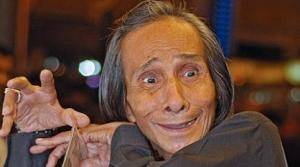.jpg)
The Lovely Bones
(With his brittle, scaffold-like frame and that hilariously horrified smile, Reynaldo “Palito” Hipolito, 75, was like a phantom from vaudeville spooking a delightful, garish milieu.)
by Francis Joseph Cruz
TWENTY years ago, Palito made me cry. I was an underweight kid and was donning a hairdo that resembled the contour of an apple. Because of that unfortunate circumstance of my distant childhood, I was frequently given names, mostly unimaginative insults such as payatot, skeleton, lampa. Having three elder brothers who have mastered the art of bullying did not help either. If anything, they enhanced the playing field, appropriating pop culture references, from Skeletor of He-Man fame to Fido Dido, into the teasing game. However, the name that I resented the most was Palito, as his very appearance, with his deathly thin face and atrophied frame, made everyone laugh. Given that I had the neurotic notion that I have become synonymous with the comedian after hearing myself being called so many times by his name, I felt that each time anybody laughed at Palito while doing his antics in his movies, they were laughing at me. I hate being made fun of and laughed at, so every time they laughed at Palito, I cannot help but cry. I imagine I was not alone in this ordeal, given the popularity of the comedian and prevalence of malnutrition in the
As I outgrew my skeleton of a body and gained a lot of weight, I also eventually outgrew that hate relationship with Palito. Without the stigma of feeling laughed at and ridiculed while watching his comedies, I immediately found the humor of Palito a welcome alternative to some of our younger comedians whose good looks obscured their attempts at comedy. However, Palito has turned into a rare treat. He was already a fixture in moviedom since the Sixties (with a considerable filmography to boot) but it wasn’t until the post-Marcos material world that he hit his stride, as a sort-of updated Bayani Casimiro (who himself was still active by this time).
The best of Palito’s kitsch works, including his take on James Bond and the Rambo-parodies No Blood, No Surrender and Rambuto, have since become urban legends because of their shameless unavailability in any of the metropolis’ video shops or television channels’ listings.
It is unfortunate that Palito is being treated as if he belongs to another era when we were a happier people. While his comedy is a million miles away from the venerated wit that we have become accustomed to, it nonetheless was effective without even resorting to excessive brain usage or verging into lewdness. His brand of comedy is inherently simple, perhaps a little bit mean-spirited because its very meat is the fact that he is obscenely meatless, and that made all the difference. He surely belongs to that era where entertainers whose self-deprecation becomes the bulk of their onscreen identities like Babalu, with his extensive chin, Zorayda Sanchez, with her distinctive facial qualities, and Mahal, with her more-than-petite body, were sellable commodities in cinema that I wish would be appreciated more today. Palito, along with those unpretentious performers, who not only gave their talents and intellect but also their very physical self just to make us laugh, deserved more from this world.
Perhaps the most popular image of Palito is of him dressed in a clean barong tagalog with cotton balls inside his nostrils laying suspiciously serene inside a coffin. His many portrayals of the dead that suddenly spring back to life, either as a zombie or as someone who was mistakenly thought of as dead, always produced the desired hilarious effect, and this, I believe, have left an indelible mark on this nation’s collective ids. The funny reaction shots of Dolphy and the many other actors who repeatedly fell for this redundant yet enchantingly enjoyable prank notwithstanding, there is simply some quiet genius in how Palito has made use of his deathly thin frame to comedic effect. Moreover, Palito, without probably even knowing it, has achieved the near-impossible. He has inflicted kneejerk humor in the very thing that all of us dread, which is death.
While he has cheated death several times in the movies, real life is something different altogether. The news broke out. Palito has died.
This time, the image of him and his fragile body lying serenely in a hospital bed did not cause endless chuckles but sincere sighs. He will be missed.
The last time I saw Palito was late last year, during the awarding ceremonies of a short film competition sponsored by an alcoholic beverage. The veritable funny man was supposedly plucked from obscurity by filmmaker Khavn De La Cruz and his gang, who aptly call themselves The Brockas, to have him play the drums in this gig. Lovingly referred to by Khavn as “No Blood Brocka”—after the Rambo variation that the comedian himself had titled—Palito introduced himself with a humility that was poignant (yet, he had never lost his exquisite timing nor that comedic value of being self-deprecating), and still, he had the crowd laughing. That night, Palito was the star. He sat behind the drums set, and with gusto that seemed unlikely with his age and frail-looking body, started beating the drums with all his heart, while the Brockas shouted and screamed expletives to the amazement of everyone. He was not only truly talented, he was legendary.
To Reynaldo “Palito” Hipolito, you made me cry, you made me laugh, and you made me cry again. For that, I shall forever be grateful.
(First published in Philippine Free Press, 17 April 2010)